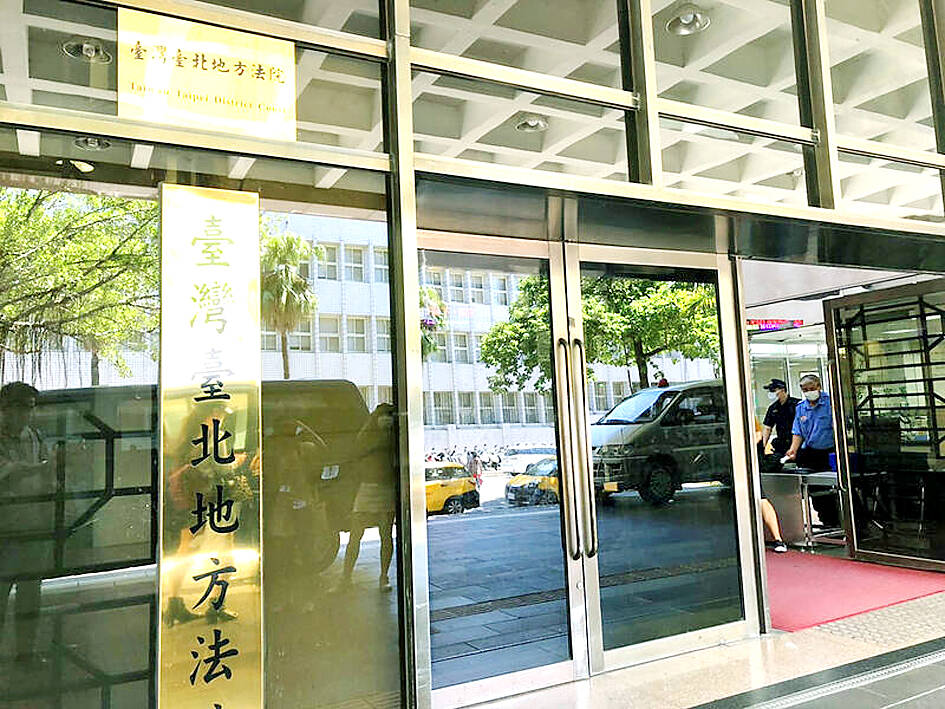The Taipei District Court on Wednesday ruled that a former National Security Bureau (NSB) official, who has been on the run for nearly 25 years, can no longer be prosecuted or punished for corruption, as the statute of limitations has expired.
Liu Kuan-chun (劉冠軍), a former NSB colonel, was accused of embezzling NT$190 million (US$6.12 million at today’s exchange rate) in funds allocated for classified government operations.
He fled to China in September 2000, before being formally indicted on Nov. 12, 2003. The Taipei District Court issued a warrant for his arrest on May 21, 2004.

Photo: Wang Meng-lun, Taipei Times
The court ruling said that under Taiwan’s laws, the statute of limitations for corruption charges is 20 years, with an additional five years added when a suspect is evading justice.
The court determined the limitation period began on April 2, 1999 — the date Liu’s alleged criminal activity ended — meaning the final deadline to prosecute him was Feb. 24, which has already passed.
The ruling can be appealed.
Prosecutors recovered a portion of the embezzled funds. In March 2023, about NT$129 million of the allegedly stolen money was retrieved after authorities seized and auctioned off shares owned by Liu.
A re-examination of Liu’s case by the Taiwan High Prosecutors’ Office in 2021 also showed that he was suspected of having surrendered to the Chinese government and engaging in espionage activities.
He is still wanted for the espionage case.

ECHOVIRUS 11: The rate of enterovirus infections in northern Taiwan increased last week, with a four-year-old girl developing acute flaccid paralysis, the CDC said Two imported cases of chikungunya fever were reported last week, raising the total this year to 13 cases — the most for the same period in 18 years, the Centers for Disease Control (CDC) said yesterday. The two cases were a Taiwanese and a foreign national who both arrived from Indonesia, CDC Epidemic Intelligence Center Deputy Director Lee Chia-lin (李佳琳) said. The 13 cases reported this year are the most for the same period since chikungunya was added to the list of notifiable communicable diseases in October 2007, she said, adding that all the cases this year were imported, including 11 from

Prosecutors in New Taipei City yesterday indicted 31 individuals affiliated with the Chinese Nationalist Party (KMT) for allegedly forging thousands of signatures in recall campaigns targeting three Democratic Progressive Party (DPP) lawmakers. The indictments stem from investigations launched earlier this year after DPP lawmakers Su Chiao-hui (蘇巧慧) and Lee Kuen-cheng (李坤城) filed criminal complaints accusing campaign organizers of submitting false signatures in recall petitions against them. According to the New Taipei District Prosecutors Office, a total of 2,566 forged recall proposal forms in the initial proposer petition were found during the probe. Among those

The Mainland Affairs Council (MAC) today condemned the Chinese Communist Party (CCP) after the Czech officials confirmed that Chinese agents had surveilled Vice President Hsiao Bi-khim (蕭美琴) during her visit to Prague in March last year. Czech Military Intelligence director Petr Bartovsky yesterday said that Chinese operatives had attempted to create the conditions to carry out a demonstrative incident involving Hsiao, going as far as to plan a collision with her car. Hsiao was vice president-elect at the time. The MAC said that it has requested an explanation and demanded a public apology from Beijing. The CCP has repeatedly ignored the desires

The Ma-anshan Nuclear Power Plant’s license has expired and it cannot simply be restarted, the Executive Yuan said today, ahead of national debates on the nuclear power referendum. The No. 2 reactor at the Ma-anshan Nuclear Power Plant in Pingtung County was disconnected from the nation’s power grid and completely shut down on May 17, the day its license expired. The government would prioritize people’s safety and conduct necessary evaluations and checks if there is a need to extend the service life of the reactor, Executive Yuan spokeswoman Michelle Lee (李慧芝) told a news conference. Lee said that the referendum would read: “Do